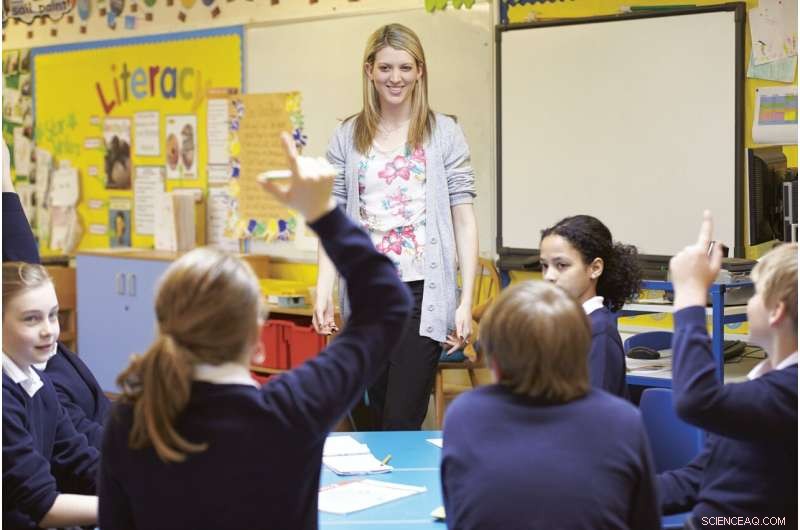
Kredit:Pixabay/CC0 Public Domain
Många lärare skulle intyga att de kallades till yrket för att utbilda elever och förbereda dem för livet, inte bara för att tillhandahålla en ekonomisk tjänst. Men i takt med att utbildning i allt högre grad politiseras och tjänas pengar, dras många lärare mellan att tillhandahålla en ekonomisk nytta och att göra det de älskar. En ny studie från University of Kansas visade att det är särskilt sant för katolska skollärare, som har utvecklat strategier för att balansera sitt kall och sitt yrke.
Utbildning har påverkats av nyliberalism och postindustrialism under de senaste två decennierna, vilket lägger tonvikt på mätbara resultat, standardiserade tester och stadig inskrivning. Debatten om huruvida utbildning ska ses som en vara eller allmännytta finns i alla skolor, men Heidi Hallman var intresserad av hur det utspelade sig i katolska skolor, vars uppdrag är att utbilda elever, men också att vägleda dem genom kyrkans lära. och att tillhandahålla en allmän nytta för alla studenter, även om de är beroende av undervisning.
Under pandemin hörde Hallman, professor i läroplan och undervisning vid KU, om familjer, inklusive icke-katoliker, som skickade sina barn till katolska skolor som upprätthöll personlig undervisning.
"Jag undrade hur dessa lärare uppfattar de utmaningar som de står inför i jämförelse med sina motsvarigheter i den offentliga skolan," sa Hallman. "Jag hörde en del beklaga förlusten av gemenskapen. Vi har sport, eller onlinegemenskapen dit vi kan nå över hela världen, och jag tror att det har varit svårt för religiösa skolor att acceptera, särskilt med stängningen av så många katolska skolor och förlusten av grannskap och gemenskap."
Hallman intervjuade 35 katolska lärare och administratörer i grundskolan, mellanstadiet och gymnasiet för studien, publicerad i tidskriften International Studies in Catholic Education .
Eftersom många katolska skolor höll sina dörrar öppna under pandemin såg skolorna ofta en ökning av antalet inskrivningar. Många nya elever var inte katoliker, men skolorna har uttalat uppdrag för att utbilda alla och kände att deras andliga komponent kunde erbjuda något för familjerna som de annars skulle sakna. Men det bidrog också till uppfattningen av utbildning som en vara, sa Hallman.
"På grund av att utbildning "finns på marknaden" tenderar vi att ha en syn på utbildning som en produkt. Det händer även inom högre utbildning, säger Hallman. "Vi vill inte behandla elever som kunder, men det fanns människor som var glada över att elever och familjer kom till deras skolor, men också en skepsis, som om folk bara handlade efter skolor."
The study participants revealed three themes in their responses to balancing teaching and vocation and how they dealt with the neoliberal and postindustrial influences on American education and policy.
First noted was technocratic professionalism. With a constant focus on professional development and skills, American education has emphasized that this type of training will develop the best educators. However, several of the teachers, especially the younger ones in the study, questioned that approach. Respondents often wondered if allowing them to draw on their faith and love for working with young people would make them more effective educators than continuously taking skills training classes.
Respondents also noted competition from the marketplace. Teachers could feel there were many outside forces pulling students away from the community provided by a Catholic school. Educators noted the pull of athletics outside the school or non-school related activities and options available via the internet and social media that resulted in a "watering down," or de-investment, of activities and teachings of the school and church. Even though schools often continued in-person education, church services were often canceled or reduced in frequency, and educators noted many people, including families of students, have not come back. They also reported fearing that students would leave the schools as public schools returned to in-person learning after the initial stages of the pandemic.
Finally, respondents reported being concerned with optimizing the student experience. In addition to state-mandated curriculum, Catholic school teachers are required to impart the teachings of the church. That part of the job often appealed to those saying faith helped bring them to the job, and that it could be a way to serve everyone, but also could ring hollow.
"If a family didn't have a religious identity, the teachers mentioned how maybe the school could offer them that, but there was also a concern that faith might simply be an add-on, or like going to the grocery store to get something you need," Hallman said.
The educators were not territorial, she added, and often looked for ways to make non-Catholic students and families feel welcome.
The findings provide insight into how Catholic school teachers and administrators view their roles in society, a topic which has been largely overlooked by academic researchers, Hallman said. Their dedication to their work, and especially reluctance to view education as a commodity while drawing on their faith as a way to help better serve students, can provide a model for preparing teachers for all schools. As opposed to simply relying on teaching a set of skills and insisting they meet mandates and measurable results, teachers could be viewed more holistically, in a way that allows them to use what inspires them, whether religious or otherwise, to be better teachers and continue to grow, she added.
"It gave me hope that religious schools can seek their religious mission, but also welcome others and maintain their commitment to the common good, even among pressures to keep enrollment up and seeing neighboring Catholic schools close," Hallman said. "These teachers were very hopeful. They often had lower wages but were very dedicated to their vocation, and I found that refreshing to hear from people in the pandemic era, when there are so many pressures on teachers." + Utforska vidare